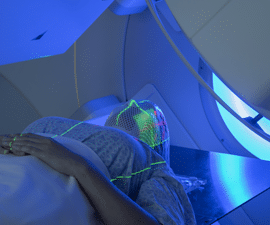
Treatment Planning and Options
Treatment Options for Lymphoma
Blood cancers, including lymphoma, are extremely heterogeneous and can involve a variety of treatment options, often in combination. Some form of chemotherapy, radiation therapy, immunotherapy, or a combination is typically used to treat Hodgkin lymphoma. Bone marrow or stem cell transplantation may also sometimes be done under special circumstances. Most patients with Hodgkin lymphoma live long and healthy lives following successful treatment.
Many people treated for non-Hodgkin lymphoma will receive some form of chemotherapy, radiation therapy, biologic therapy, immunotherapy, or a combination of these. Bone marrow, stem cell transplantation, or CAR T-cell therapy may sometimes be used. Surgery may be used under special circumstances, but primarily to obtain a biopsy for diagnostic purposes.
Although “indolent” or slow-growing forms of non-Hodgkin lymphoma are not currently curable, the prognosis is still very good. Patients may live for 20 years or more following an initial diagnosis. In certain patients with an indolent form of the disease, treatment may not be necessary until there are signs of progression. Response to treatment can also change over time. Treatment that worked initially may be ineffective the next time, making it necessary to always keep abreast of the latest information on new or experimental treatment options.
Consider using the Lymphoma Research Foundation’s Lymphoma Care Plan, to keep track of your treatment and treatment outcomes provided by your doctor and other members of your healthcare team.

ACTIVE SURVEILLANCE (WATCH AND WAIT)
With active surveillance, patients do not receive any anti-lymphoma treatments but their health and disease are monitored through regular checkup visits and follow-up evaluation procedures.

CANCER SUPPORTIVE CARE DRUGS
Supportive care drugs may be used to address conditions caused by cancer or its treatment.

clinical trials
Clinical trials are appropriate for patients at all stages of disease. The purpose of a clinical trial is to safely monitor the effects of a drug on patients over time and to identify more effective therapies for specific diseases. By participating in a clinical trial, patients may or may not get access to the newest therapies but will receive quality care in a very carefully controlled and supportive environment.

immunotherapy
The term “immunotherapy” (also called immune-oncology) refers to treatments that interact with the immune system.
The purpose of the immune system is to eliminate harmful pathogens, like bacteria and viruses, as well as cancer cells from the body. However, in many cancers, including lymphoma, the immune system doesn’t work properly, which allows the cancer cells to grow and spread.

PALLIATIVE CARE
Palliative care is specialized medical care for people living with a serious illness, such as cancer or heart failure. Palliative care is meant to enhance a person’s current care by focusing on the quality of life for them and their family.

radiation therapy
Radiation therapy (also called radiotherapy) uses high-energy x-rays to kill cancer cells and shrink tumors. Radiation is a local therapy, which means it only affects cancer cells in the treated area. Radiation is sometimes used alone for certain localized lymphomas, either nodal or extranodal, or may be combined with chemotherapy.

stem cell transplantation
The ability to transplant stem cells allows physicians to use higher doses of chemotherapy to treat the cancer than the body would normally tolerate, increasing the probability of killing cancer cells. If the chemotherapy is followed by an infusion of stem cells, these new stem cells can replace the cells in the bone marrow that were destroyed during the chemotherapy treatment.

TARGETED THERAPies
Most types of targeted therapy help treat lymphoma by interfering with specific proteins that help tumors grow and spread throughout the body.
Learn More About Treatment Planning
The first steps in participating in treatment are to ask questions, learn about options, and work closely with the doctor. Being a self-advocate and an active participant in one’s own healthcare can be a positive experience and may help restore hope and control following a diagnosis.